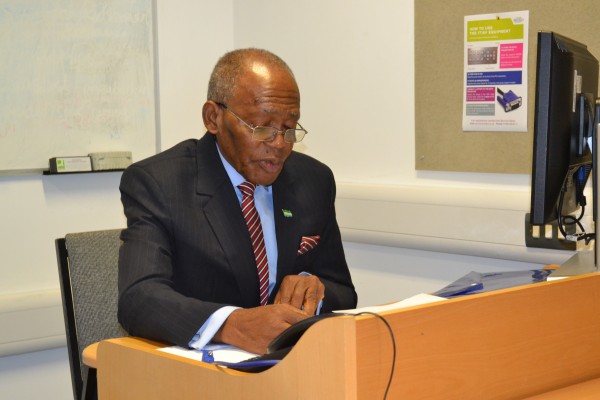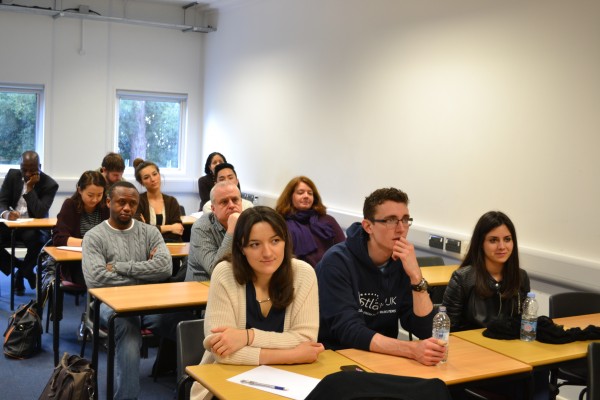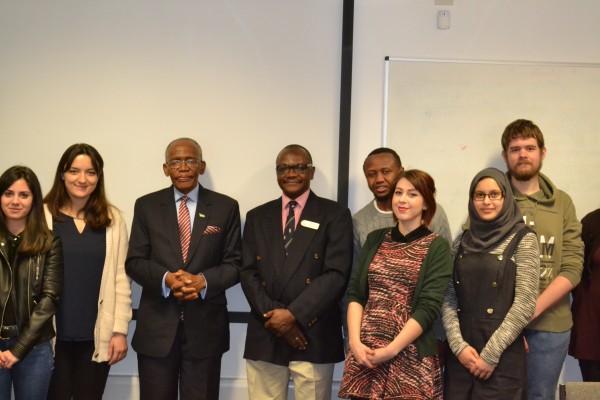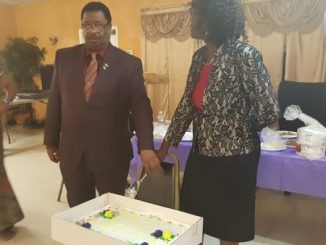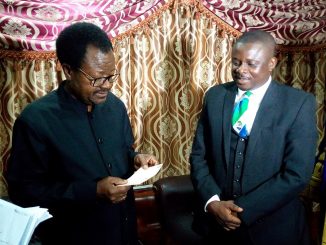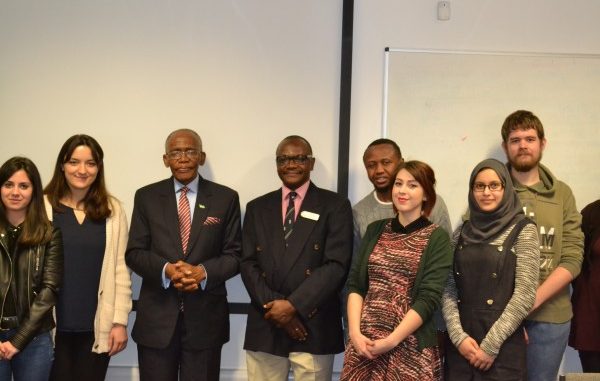
Sierra Leone’s High Commissioner to the United Kingdom has shared his experience on
law, diplomacy and politics, during an address to law students at Oxford University
where he was invited as a special guest at a special ceremony.
His Excellency Edward Mohamed Turay described Oxford as a ‘Great University’ and
expressed his delight to be honoured to speak to students for the second time in
successive years.
“I must confess that I am beginning to fall in love with this Great University. I say so with
profound respect, pride and emotion, because this is my second time in this place in
successive years,” the High Commissioner said.
He shared his experience in law having qualified as a Barrister in the United Kingdom,
then practiced in the Caribbean for some years, held various posts in the judiciary, before
going back home to Sierra Leone, where he also practiced successfully and enhanced my
experience and skills.
Turay also shared his experience working in the diplomatic community in the United
Kingdom as well as his active days in politics back home in Sierra Leone.
Please see below for the full address…
NAVIGATING THE LAW ACROSS JURISDICTION
A diplomatic experience
Panel of this Distinguished August Body of Academics, the Oxford Brookes University, Fellow
Diplomats, Ladies and Gentlemen, I greet and respect you all. I must confess that I am beginning
to fall in love with this Great University. I say so with profound, respect, pride and emotion,
because this is my second time in this place in successive years.
I also, say so because my country, its people and Government believe in this great University,
which, along with Oxford University in the great city of Oxford, are jewels in the crown of this
Great Nation in terms of academic achievements. Of course academic pursuit and the quest for
knowledge are among the great and historic gifts this nation has benevolently given to the
world, including my country, Sierra Leone in West Africa. I can only say that I am extremely
grateful and honoured to be here and for the second time.
I start off this talk by paraphrasing the summaries of three salient points made by a Philosopher
and two Literary Critics. The philosopher I speak about once said in his moment of despair that
nation states, the polity has become more palpable in their day-to-day making and dispensation
of laws than the period of Homer and Jesus Christ.
Should that baffle you, I ask you kindly to listen to the last two below. They are not by
Philosophers but Literary Critics:
“There is an assignment, it is carried out by people they call diplomats. These personnel claim
to be neutral in political matters. They also claim to owe loyalty to no particular political party.
They claim to be on the side of the state, yet politicians and Government of the day appoint
them. There is also something paradoxical about them. They represent the government that is
in power as well as their countries. It means that since they represent their countries and
governments abroad in other countries, it is incumbent on them to act and negotiate on behalf
of politicians. They make treaties in relation to trade and commerce, national security, global
matters and international law which affect the countries they represent as diplomats. The
million dollar question is: How on earth can these diplomats negotiate their ways across
Jurisdictions?”
Here is the other critical quote:
“Laws and their judicial systems which make them not just drop out from the skies, they are
manmade, so are diplomatic arrangements and dispensations concluded by diplomats, and their
paymaster. In politics as in international relations and diplomacy, jurisdictions and diplomats
are not sworn enemies, they are friends, and they worship at the same shrine. Hence they have
no choice but to find mutual grounds, accommodations, create trust among themselves and
make the world a peaceful and better place”.
We diplomats may be called by different names according to our status. Some of us are called
Ambassadors, others are called High Commissioners but we are all commissioned to represent
our countries and governments abroad. In brief, we are the mouthpieces of the entities on
whose behalves we speak and act.
These are the challenges we face on daily basis. Our roles have their inherent challenges and
opportunities. The qualifications we need for the job are not clearly defined. Arguably, this is
true of diplomats all over the world, geopolitical differences not withstanding! To be a
successful career diplomat in the complex world, a diplomat must think critically and take
decisions in split seconds in matters that can be quite unpredictable and fluid. We live in the
world full of uncertainties; we need sharp, cool and calculated diplomats that can think on their
feet.
Some will tell you that all that is required to become a successful diplomat is preferably a degree
and skills backed by tact. I am a lawyer by profession. I read and qualified as a Barrister in the
United Kingdom. I practiced in the Caribbean for some years, held various posts in the judiciary,
and then I went home to Sierra Leone at the behest of my government and country. There I
practiced successfully and enhanced my experience and skills. I became a Senior District /
Circuit Magistrate. After a long spell in the judiciary, I then became a politician of the All
Peoples Congress (APC) party.
I took over our party after the popularity of the leader and party declined. During my
leadership, I transformed and revived the fortunes of the party. We once again became a
credible force. We became the Leading Opposition party, till the current President took over as
Leader of the Opposition, and then in 2007, we became a Ruling Party and we are still in power
in our second term in office with Dr Ernest Bai Koroma as our President and Leader of the party.
Like I stated inter alia, diplomats in this day and age are faced with challenges and
opportunities. However, the success or manner in which you seize upon those opportunities,
maximize them and ward off the challenges depends largely on how you navigate across
jurisdictions.
Be reminded that we live in a complex world that is influenced by globalized socioeconomics,
politics, legal, judicial matters which require far reaching strategies, as a consummate diplomat.
Sometimes, issues are sensitive, challenging, politicized and yet the decisions you make are
critical to securing, and maximizing gains in the interest of the country and the government that
pays your salary. These realities of a diplomat’s life put him sometimes in opposition or draw
him closer to concurrences with the judiciary or legal provisions, precepts of other countries.
There are two layers to the implications of globalization and postmodernity. They bring
immense weight and pressure to bear on the jurisdictions of modern nation states. On one
hand, they may influence national constitutions of states, but national constitutions vary, so are
their legal systems. On the other hand, the corporate mega businesses of the corporate world
have the ability to mount immense pressures of their own that we cannot dismiss. They equally
can pressurize state apparatuses to the extent that, their powers could become vulnerable and
are put at risks of diminishing.
Typical examples are in the key areas of Global Security, Global Economic Development, Climate
Change, Human Rights, Migration and Humanitarian catastrophes and their solutions. The
stakeholders and agencies, which operate or inform the running of these important
organisations are potent powers perceived as the all-powerful and amorphous in the contexts of
globalization and modernity. National politics and decisions at international, global levels are
no longer taken in isolation of these organisations or second, third, players or interlocutors.
These realities have informed the manner in which the modern diplomat navigates around
nation states and their jurisdictions.
Let us reflect on the big issue for once, they constitute the mega narratives of our current world.
The case of negotiating the release of hostages in troubled zones or failed states are typical
examples. Decisions reached in this and other related situations are more often than not, based
on situation ethics. By that I mean that they are not necessarily based on clear-cut policies or
laws enshrined in national constitutions. In this and countless crucial cases, diplomats are
constrained to tow the lines of their governments and by implications, those of their
governments, states and their jurisdictions.
In his or her many strategies employed or deployed to navigate across jurisdictions, a sensible
and experienced diplomat should be tactful. They should ensure that where there are
convergences and compromises and adherences become compellable factors, they should be
accomplished at all cost. This should be the case in order to avoid or minimize conflicts
between states.
We are all aware that since the era of one of the great diplomats, the US Foreign Secretary,
Henry Kissinger, the world realised that diplomacy, rather than warfare has been the panacea of
many of the troubles we face. This brings me to the subject of international organisations and
their influence. We have to reflect on them due to inherent logic and pertinence to the topic
under discussion.
Arguably, the manner in which the powers of the jurisdictions of Nation States have become
subservient to the dictates of organisations such as the UN Human Rights Commission even as
we deal with issues of national and international security are vital to this logic. Their powers
and influences cannot be overemphasized nor should we underestimate them. Arguably, the UN
and its allies have brought pressures to bear on the EU in dealing with the ongoing migrant
crisis across the borders of Europe and elsewhere. The UN, WHO and their allies put the same
pressures on the governments and countries to respond proactively to the Ebola epidemics in
Guinea, Liberia and Sierra Leone. Diplomats had to tow the lines of the organisations as well as
the positions of their governments and their own national governments.
Since the establishment of the United Nations in 1945, human right issues have assumed the
status of virtues, not vice anymore, prior to its inauguration. It is the case that there are human
rights tragedies in most places in the World, including Syria, Iraq, Libya, Yemeni, Darfur in
Sudan, The DRC, Somalia and Afghanistan, to name a handful. But we should appreciate the fact
that diplomacy and its accords have always championed good courses, and they end up in
peaceful resolutions through diplomacy, not senseless wars.
The values of my country, which I represent as High Commissioner in this country, are offshoots
of Great Britain’s in many things, being a former British Colony. We don’t negotiate with
terrorists, including rebels that commit brutal killings. However, when governments are put to
the utmost test, circumstances can bring about negotiations. Sierra Leone was put to a test
during the Civil War in 1991. I must ask you to appreciate the fact that been Sierra Leonean, I
can’t afford to rehearse, repeat the war crimes committed during that senseless war. They are
still debilitating scars on our country.
The atrocities committed by the rebels and their allies, including mercenaries and other warring
belligerents became so unbearable, to the extent that our Legal System, Judiciary and the
government of the day had no choice but come around the diplomatic table with the aid of the
AU, ECOWAS, UN, EU and the British Government and make peace. These diplomatic strategies
produced the Lome Peace Accord that concluded the war in Sierra Leone.
After that there was even more critical diplomatic strategy required in order to nurture, cement
lasting peace in the country. It was very critical and complex, and so it ran into political
conflicts and controversies. There was the proposition that we required a War Crime Tribunal
and Special Court in Sierra Leone, in order to redress the critical issues of justice and fairness,
all in order to consolidate peace and harmony.
The National Constitution, Judiciary and Jurisdictions had to adapt, adjust to negotiations,
reforms and in order to reach a respectable and amicable consensus of the matter. The 1991
Peter Tucker Constitution of which Committee I was one of the leading members ratified by our
parliament in 1991 and was reviewed and adjusted accordingly in order to accommodate the
logic and rationale of the new dispensation.
It was then that diplomacy was empowered to navigate successfully and bring about the lasting
peace we are currently enjoying in post war Sierra Leone. This goes a long way to buttress what
I said and quoted inter alia. The world of Diplomacy and Jurisdictions, legal system are co-
relative. In critical situation the ones I have identified, complement one another.
During the recent Ebola epidemic in the Republics of Guinea Liberia and Sierra Leone,
diplomacy and Diplomats, backed by their governments and Foreign Ministers and Ministries in
the affected countries were at the forefront of the search of the right answers and solutions. I
had to put my shoulders to the wheels and galvanise the logistic and financial supports by
various countries, including the United Kingdom Government, Charities and the Sierra Leonean
community here in the UK and elsewhere in the EU under my diplomatic jurisdiction.
We had a review, negotiate at various levels in order to reach the solutions we reached. It is
obvious that there were crucial instances whereby the natural hard stances of the affected
countries were compromised, if not made adaptable by virtue of the severities of the situations
on the ground.
These constraints which nation states and their diplomats have to embrace are part and parcel
of the new global phenomena in order to navigate across jurisdictions. The constraints and
realities are found in politics, socioeconomic arrangements as well as state security. They have
impacted seriously on the State and their actors, including diplomats, politicians and civil
servants, to the extent that diplomats can’t perform successfully on the internal arena without
applying the concrete strategies I have mentioned as ideal tools to navigate across jurisdictions.
Finally, I want to thank you for granting me this audience, and draw your attention to one final
point. The world used to be perceived as nation states scattered here and there with different
ideologies, philosophies and borders. That is no longer the case, the world is interconnected.
The new reality is that because we live in a world with different boundaries, ideas, perceptions
and personal interests have shrunk considerably, the new world has been reduced to a tangible,
cogent global village. By implication it is this new world that we diplomats have to deal with in
our day-to-day navigation across jurisdictions.
May God save and Bless the Queen, the Continent of Africa, the Republic and Government of
Sierra Leone my country and the Great and respected Oxford Brookes University.
His Excellency Edward Mohamed Turay
Sierra Leone High Commissioner to the United Kingdom and Northern Ireland
(CREDIT: Public Information Department – Sierra Leone High Commission – United

